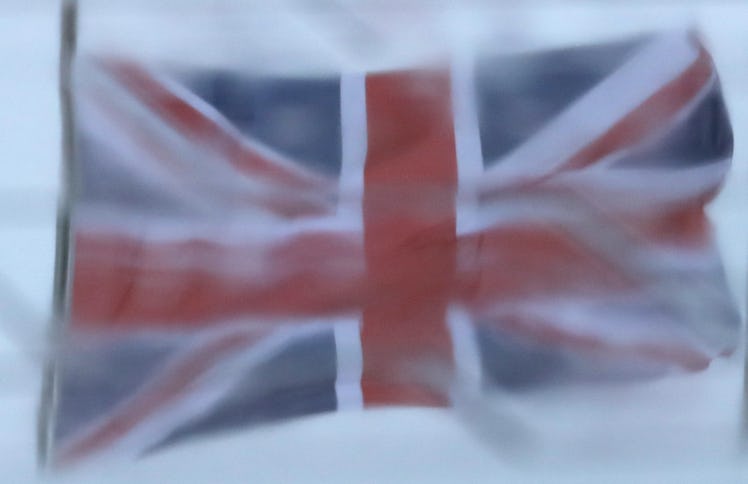
There Could Be Major Consequences After The U.K.'s Brexit Vote Got Delayed
While there's plenty of drama happening in American politics as 2018 comes to a close, a fresh political showdown is underway across the pond as leaders negotiating the deal for Britain to leave the European Union are struggling to get buy-in from everyone. So what's happening with Brexit, exactly? The developments in the U.K. don't bode well for a smooth exit process.
On Monday, Dec. 10, Prime Minister Theresa May announced that the so-called "meaningful vote" on how to leave the EU was being postponed, in a move that left many both inside and outside London stunned. Though the vote was due to happen in Parliament on Tuesday, according to the BBC, on Monday, May pushed it back over concerns that she wouldn't get the votes needed to pass it at this time. Per Reuters, May is now looking to get a vote before Jan. 21 of next year.
The initial referendum for a British exit ("Brexit") from the EU was passed by U.K. voters in June 2016, resulting in the decision for the U.K. to leave the decades-long economic and geopolitical partnership of close to 30 European countries, which has allowed for freer trade and mobility between its members. Per union rules, the U.K. has until March 29, 2019 to make its exit, BBC reports. But there's been trouble getting all parties to agree on a deal that dictates the terms of the exit, and the window for negotiations is rapidly closing. If no deal is reached before then, the U.K. will essentially make a cold-turkey exit that will upend the social and economic dynamics of the relationship overnight.
So as of now, both the exit itself and the withdrawal date are set. At this point, the argument is over the terms under which the U.K. actually leaves the rest of the union. As The New York Times points out, leaving the EU with no deal at all would create chaos, and other political options — including revising the agreement or holding a new election to try to gain the deal more support — are politically tricky. Another long-shot option is the fact that Brexit itself has a fair number of opponents, and the EU could decide to give the U.K. an extension on its exit date if it appears possible that it will be reconsidered. But undoing the decision to leave altogether would require another change in U.K. law, per the BBC.
The vote Parliament was set to hold on Tuesday would've been to approve the exit deal. As of late November 2018, the EU and U.K. agreed on a two-part draft of the proposed exit agreement. The first part, a withdrawal agreement which is legally binding, laid out a few broad points. First, it dictates that the exit process would begin with a period of transition that could last up to 2022, and in that time the U.K. would pay an estimated £39 billion to the EU for its obligatory contributions. Second, residency and citizenship for EU and U.K. citizens wouldn't be affected by the change, and anyone who changed residency during the transition could stay after that period concludes.
The second part, a future relations document, is not legally binding and lays a framework for the general dynamic the U.K. and EU wish to maintain after the exit, and concerns how the independent entities will resume trade and security operations, among other things.
One of the sticking points in the deal is how to deal with the border in Ireland and avoid a "hard border" between Northern Ireland (part of the U.K.) and the Republic of Ireland, which will remain a member of the EU.
Even with a delayed vote, it's far from certain this current draft agreement will ever meet with the approval of British lawmakers. Members of Parliament greeted May's announcement Monday to delay with laughter. The same day, one member of Parliament stunned his fellow lawmakers in session by removing the mace, a five-foot-long metal ornament symbolic of the royal duties of the legislature, to make a show of protest against May. The gesture, symbolically questioning the authority of the chamber, and served as a reality check for where the country is at as the tension of the Brexit deal has continued to balloon.
The decision to leave the EU is widely seen as an isolationist move for the U.K. that echoes President Donald Trump's push for the U.S. to leave various international agreements. The U.K. exit is largely backed by the political right, but it's become a massively divisive issue; Britons both for and against the decision came out en masse to protest in London over the weekend of Dec. 9, according to The New York Times. The decision will have ramifications far beyond British borders, and global markets on Tuesday were reacting to the uncertainty.
But for such a tense moment in British politics, on Tuesday May herself appeared to get stuck in her car on live camera, prompting jokes about exiting.
As of Tuesday, May was touring European capitals to rally support for a deal, but things remain far from certain if she'll get the backing she needs to move forward with that agreement before the clock runs out.